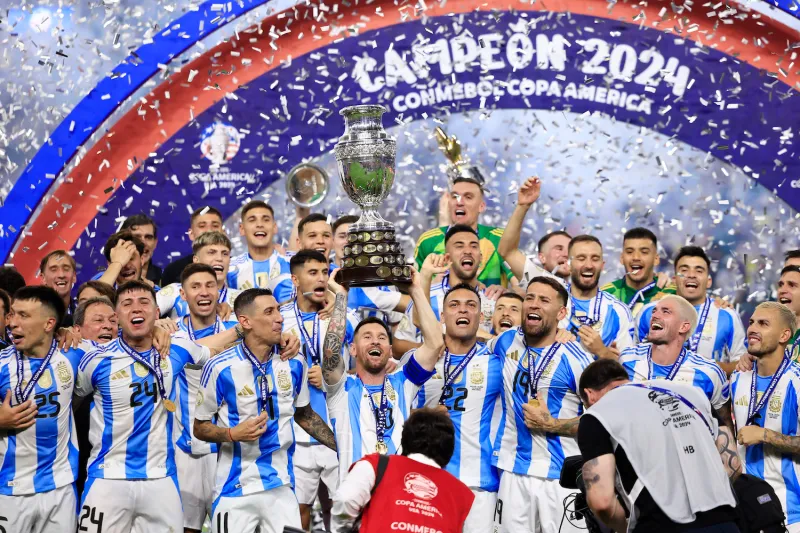A Cuban student looks at Korean dolls at the Korean Cultural Center and Language School in Havana on Oct. 30, 2023.Yamil Lage/AFP via Getty Images
Cuba and the Koreas. A North Korean diplomat who had been posted to Cuba defected to South Korea in in recent months, South Korea’s intelligence agency announced this week. He is the highest-ranking North Korean diplomat to escape the country since 2016.
The defection comes amid a thaw in ties between Cuba and South Korea. The two countries established official diplomatic relations in February in a move that Seoul claimed would deal a “political and psychological blow” to Pyongyang, which has said it enjoys “brotherly ties” with Cuba.
North Korean state media abruptly halted its mentions of Cuba soon thereafter, which analysts said expressed Pyongyang’s dissatisfaction with the country. South Korean outlet Chosun Ilbo reported that the diplomat who defected had been tasked with trying to block the Havana-Seoul rapprochement.
Prison count. Human Rights Watch this week issued one of the first public estimates of how many children have been jailed in Salvadoran President Nayib Bukele’s sweeping crackdown on gangs. The organization counted more than 3,000 child detainees, many of whom “have no apparent connections to gang-related violence or criminal activities.” Another report by Salvadoran rights group Cristosal said that four children have died in detention.
Around 1 percent of El Salvador’s population has been detained since Bukele declared a state of emergency in the country in March 2022. Rights groups have repeatedly called for a new approach to organized crime that includes due process and efforts to address child recruitment; Bukele has brushed away those appeals and instead become one of the most popular presidents in the region. Other countries, including neighboring Honduras, are moving to emulate his security policies.
Deep-sea mining. Kingston, the capital of Jamaica, has served as the headquarters for the United Nations International Seabed Authority since its founding in 1994. Negotiators are meeting this week to try to make progress on a long-stalled agreement that would establish rules for deep-sea mining in international waters. The gathering comes just as the Pacific island nation of Nauru and a Canadian mining company say they plan to move forward with a contract—whether the U.N. sets rules or not.
The energy transition has accelerated global interest in deep-sea mining, as many of the minerals under the ocean floor could be used in technologies such as batteries. But too much disturbance of ocean habitats risks causing further climate disruption. Understanding those risks matters, biologist Diva Amon told FP’s Christina Lu in 2022, “so that we don’t make the same mistakes that we have made previously in terms of resource use on this planet.”
South Korea suspended diplomatic ties with Cuba in the wake of the Cuban revolution. What year was that?
1959
1964
1969
1974
A multiyear uprising succeeded in overthrowing the dictatorship of Fulgencio Batista on Jan. 1, 1959.

Soccer player Lionel Messi of Argentina celebrates with his team after their victory over Colombia in the final match of the Copa América tournament at Hard Rock Stadium in Miami on July 14.
Soccer player Lionel Messi of Argentina celebrates with his team after their victory over Colombia in the final match of the Copa América tournament at Hard Rock Stadium in Miami on July 14.Buda Mendes/Getty Images
On Sunday night, the hemisphere’s eyes turned to Miami for the final match of the 2024 Copa América, between Argentina and Colombia. After a tearful Lionel Messi exited the pitch with an ankle injury in the second half, Argentina managed to defeat Colombia 1-0 in extra time.
Interest in soccer has grown dramatically in the United States since it last hosted the Copa América in 2016. Technically, the soccer tournament is meant for South American teams, but it has occasionally invited a handful of northern neighbors—such as Mexico, the United States, and Canada—to participate, too. With those three countries due to co-host the 2026 Men’s World Cup, this year’s tournament served as a kind of dress rehearsal.
On one important metric—stadium and crowd control logistics—Copa América featured a string of problems. They escalated into a tumultuous crowd crush outside the stadium before Sunday’s game, delaying its start for more than an hour. By the time authorities regained control over the venue’s entry and exit, some fans who had paid thousands of dollars for tickets remained outside the stadium, forced to watch the match on TV.
The Miami stadium and the South American soccer federation CONMEBOL blamed each other for the mayhem. A different organization, FIFA, is running the World Cup. But “there’s still a lot of work to be done” on the logistical front, tournament attendee Alejandro Sanguinetti, who directs an amateur soccer club in Washington, D.C., told Foreign Policy.
By another metric—U.S. viewership—the tournament broke records. Fox, which has the U.S. broadcast rights to Copa América, registered an average of more than 6 million viewers for the final match and 1.42 million for matches generally. The latter figure represents an increase of 350 percent from the last tournament in 2021. It didn’t hurt that one of the teams was reigning world champion Argentina, captained by Messi, who is regarded as one of the best players of all time.
To many fans, the tournament felt like a broader celebration of Latin American culture in the United States. Venezuela was a surprise quarterfinalist, a point of pride for a country that has endured a tumultuous past decade. Sanguinetti said that barbecue tailgating outside the games reminded him of watching matches in his native Uruguay.
With its growing soccer spirit—which persisted despite the poor performance of the U.S. national team—the United States is increasingly part of the world’s sport. Hosting the tournament “makes the United States more global,” Colombia fan Felipe Muñoz told Foreign Policy.
Source link : https://foreignpolicy.com/2024/07/19/trump-gop-vance-latin-america-deportation-tarriffs-cartels-military-bolsonaro-stabbing/
Author :
Publish date : 2024-07-19 08:00:19
Copyright for syndicated content belongs to the linked Source.












